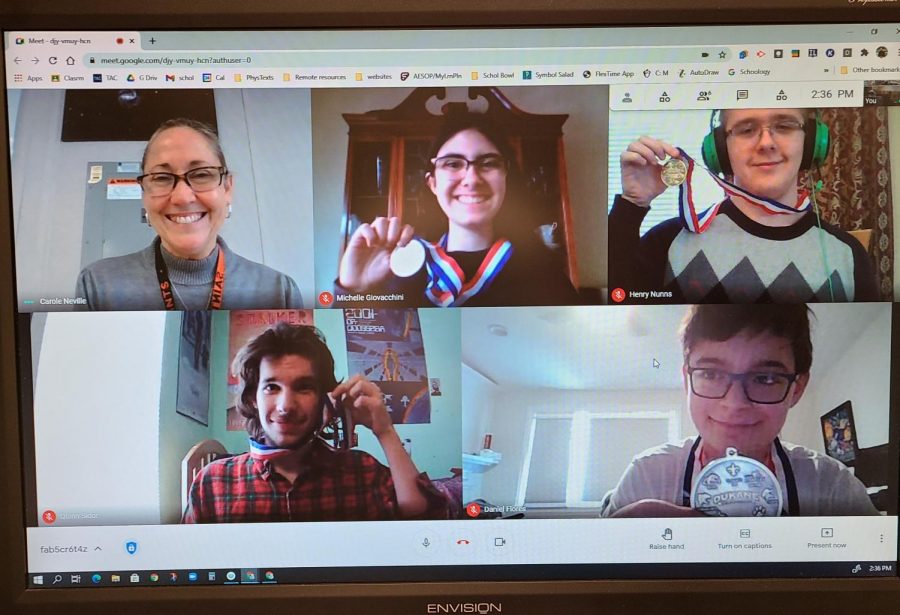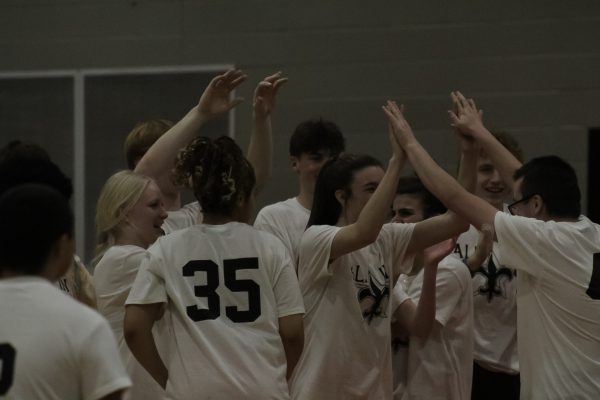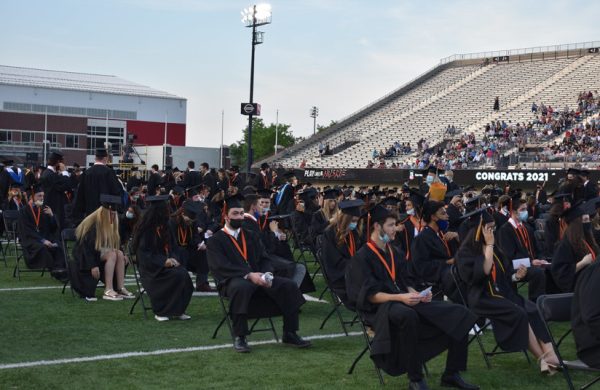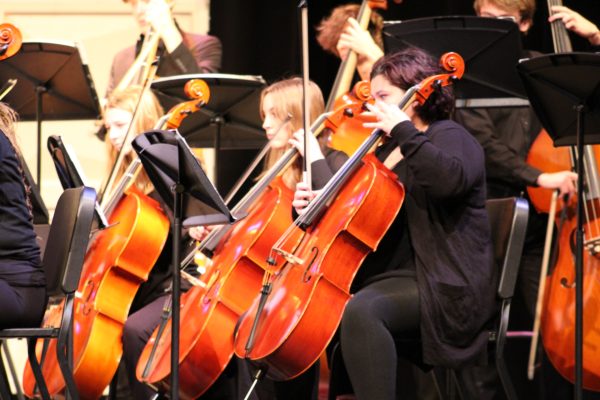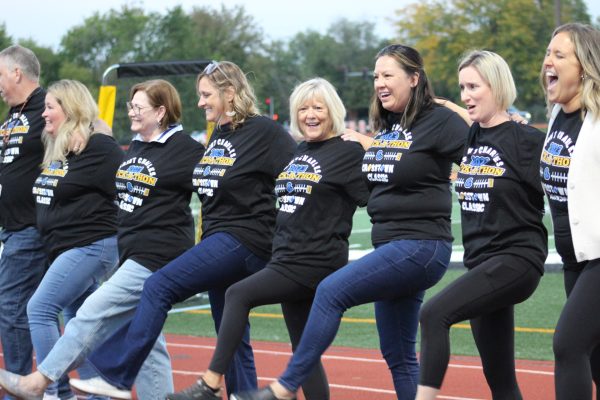Scholastic Bowl Secures Conference Championship
Photo courtesy of John Connell.
Co-advisor Carole Neville, Michelle Giovacchini, Henry Nunns, Quinn Sidor, and Daniel Flores with their first-place medals from the Conference tournament.
March 2, 2021
“How many limbs are tetrapods typically considered to have?”
For many, the thought of answering difficult trivia questions with the success of a team riding on your answer sounds like the furthest thing from an enjoyable evening. For East’s Scholastic Bowl team, however, this experience is thrilling.
(The answer is four, in case anyone is still wondering.)
On February 8, East’s Scholastic Bowl team finished their season as conference champions. The team includes Captain Michelle Giovacchini, senior Henry Nunns, junior Quinn Sidor, sophomore Daniel Flores, and junior Ben Seltz. All except Seltz participated at the conference tournament.
Entering the DuKane Conference tournament, the East team was ranked second, with a 6-1 record in-conference. During the tournament, though, East managed to beat Lake Park, Wheaton North, and Glenbard North on their path to the championship.
In a Scholastic Bowl tournament, each round consists of “tossup” and “bonus” questions. During a round of 20 tossup questions, any team member on either team can “buzz in” and try to answer. Each question begins with multiple clues, starting with the least obvious and ending with more obvious connections. Once a team gives the correct answer for a tossup question, they are able to answer a bonus question. The bonus question has multiple parts, and teams can confer before answering. If they answer the bonus incorrectly, though, the other team has an opportunity to steal the point. At the end of the match, the team with the most points wins.
Senior Henry Nunns described their first win against Lake Park. “There were some technical and procedural hiccups,” Nunns said, “but despite this, the game as a whole went well.” East won the game with a score of 350-190. After the game, Nunns said that their coach, John Connell, “reminded [the team] that although [they] may have been a bit frustrated by the play-of-game issues, [they] needed to stay focused and not worry about it.”
East’s second round was against Wheaton North. According to Nunns, “[Wheaton North] was a much more difficult opponent.” During this game, East got off to an early lead, but were only ahead by a few points at halftime.
“The second half was especially hard fought,” Nuns said. “Going into the last three questions, the game could have tipped either way.” Eventually, though, East managed to pull ahead, winning the game 290-250.
East’s final round was against Glenbard North. Going into this round, Nunns said that the team was tired after battling a “slew of technical issues over the course of the night,” all of which were due to the remote format of the competition. Like many other activities, Scholastic Bowl has been forced to go fully remote due to COVID-19 restrictions.
Changing from in-person to fully remote has shifted how the Scholastic Bowl team operates. Normally, a lot of strategy is put into the seating arrangement of team members at meets. Nunns said that this is done so “the captain [can] hear everyone, and each person [sits] next to someone who would share some fields of expertise with them, so that [they] could bounce ideas off of each other.”
However, in a fully remote setting, the seating arrangement becomes irrelevant. A remote setting also means that the team members have to buzz through third-party, online systems, which Nunns said led to some technical difficulties. In general, though, Nunns said that “it’s the same game that it’s always been.”
During the Glenbard North round, East began with a strong showing, but Glenbard North managed to close the gap by halftime. According to Nunns, the second half of the game was “very nearly ‘maxed out.’” In Scholastic Bowl, the term “maxed out” means that there were almost no questions answered incorrectly by either team.
Throughout the second half of the round, it stayed close–Nunns said that both teams called timeouts prior to the last five questions. Going into the final question of the game, East was ahead by 30 points. Because of the point system, though, this meant that Glenbard North could still win if they got all parts of the final question correctly. However, Nunns was able to answer the question correctly. The final score of the game of 350-300, making East the conference champions.
Nunns said that, while winning meets and tournaments is one part of Scholastic Bowl, it is not the most important part in his mind. “Above everything else,” Nunns said, “it’s a fun team environment.”
Nunns said that there is a large emphasis on “never singling anybody out for making mistakes or being wrong or not knowing something.” To win a Scholastic Bowl game, you have to “have the confidence to buzz in and take a shot at questions before you’re 100% sure. This means that you have to be comfortable being wrong in front of the team, sometimes multiple times in a single game,” Nunns explained.
The team environment is supportive, uplifting, and encouraging, Nunns said. After any game, even if the team didn’t win, Nunns said that team members congratulate one another on the questions that they got right. “Everybody is always doing their best to support each other,” he said. “That’s probably been the main reason that it’s always so much fun to go to practices or meets.”
Overall, Nunns said that the team is very satisfied with their season, especially considering its culmination in a conference championship. Even though there were some technical difficulties, frustrations, and disappointments in the season, Nunns said that the team “still had the opportunity to play, and to function as a team. That opportunity, in the face of a lot of activities becoming more individual, more disconnected, and less frequent, stood in sharp contrast.”
At the end of the day, Nunns said that “it was awesome to see that just being apart didn’t actually make us ‘distant.’”


